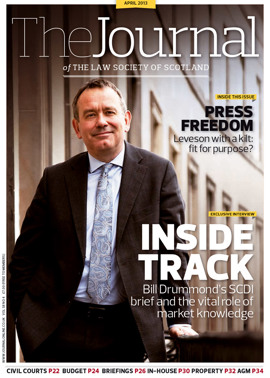Opinion column: Elaine Sutherland

Reforming the law of marriage should be the opportunity to remove the anomalies and complexities caused by making marriage available in both religious and civil ceremonies.
With the Scottish Government now considering responses to its draft Marriage and Civil Partnership (Scotland) Bill, much attention remains focused on the welcome proposal to introduce same-sex marriage.
There has however been a dearth of discussion of the fact that the proposals continue to envisage marriage by means of both civil and religious ceremonies. At present, civil marriages are performed by registrars and, since 2002, may take place in registry offices or other approved places. Religious weddings may be performed by certain religious celebrants, and how they are authorised depends on the religion in question. All Church of Scotland ministers, and certain other celebrants, have automatic authorisation. However, some religious groups are treated differently and can only register named individuals, as can the Humanist Society of Scotland. This picture will become more complicated under the bill. The good news for other belief groups is that they may be allowed into the club, if only to the current second-class membership. It is not yet clear whether the Church of Scotland will be the only first-class club member.
An additional layer of complexity will be added because some religious groups will perform marriages for all couples, irrespective of sexual orientation, while others will be allowed to opt out of same sex-marriage. Religious groups and celebrants will also be able to perform civil partnership ceremonies, but probably only for same-sex couples.
The point is that the law does not have to be so complicated. Instead of having this bewildering array of celebrants, it could simply provide for all marriages and civil partnerships to be solemnised in a civil ceremony performed by a registrar. In terms of legal requirements, that would be it. Couples would be free to have a further celebration – religious, secular, pagan or whatever mattered to them – but it would be of no legal significance.
This approach would mark the final step in the separation of church and state in Scots family law. Pre- and post-Reformation, religions have had jurisdiction over marriage, annulment, legitimacy, inheritance and so forth. Since 1830, however, all of these except marriage have been dealt with by the civil law. Religious marriage is a legal anachronism.
There is much to be gained by separating the legal solemnisation of marriage from religious rites. At present, the state makes invidious choices between religious groups in terms of which celebrants may perform marriages. That process will only increase under the reform proposals. Were all marriages the province of civil registrars, Government would be freed from this unseemly task – and the prospect of an embarrassing challenge before the European Court of Human Rights. The Government plans to allow religious groups to opt out of performing same-sex marriages. If a group does this, however, it leaves itself open to challenge under the Equality Act 2010. The Government has anticipated this problem and will seek to have the Act amended at Westminster, but the opt-out might still face a human rights challenge, with more potential embarrassment for ministers.
If marriage were to be a wholly civil affair, state agencies would also be better placed to do things they should be doing. At present, the state plays some role in overseeing the formation of all marriages and civil partnerships, but acts at one step removed from key stages where marriages are performed by religious groups. As a result, its ability to identify, and offer protection in, cases of forced marriage is compromised. If registrars solemnised every marriage and civil partnership, coercion might be spotted more easily.
Civil marriage has much to recommend it to religious groups. A number of these groups have lobbied hard against the introduction of same-sex marriage, leading to accusations of homophobia and bigotry as well as internal divisions. They are seen as imposing their beliefs on those who do not share them. By separating the formation of marriage and civil partnership from religious rites, religious groups could still fulfil their proper function by providing ceremonies giving their seal of approval to the unions of their members. This has been recognised in many other countries – including some with strong religious traditions, such as France, where civil marriage is the only option.
Separating the religious from the secular is the norm in modern Scotland. Baptism, important for many religious groups, has no legal significance. Similarly, some do not regard divorce as freeing the parties to remarry, but accept their members using the legal mechanism to organise the care of children and the division of property. Religious marriage is the oddity and the Scottish Government should rethink its position and confine the solemnisation of marriage and civil partnership to a civil ceremony.
In this issue
- Fifty shades of lay?
- Employee owners: a view from across the Pond
- All change
- EIAs: increasing the impact
- Mooting comes to Strasbourg
- Reading for pleasure
- Opinion column: Elaine Sutherland
- Book reviews
- Profile
- President's column
- Minimise the risk of rejection
- Helping with enquiries
- Path to growth
- New starts for all?
- Leveson: alarm bells
- McLeveson: still in balance
- From Gill to Bill
- A Budget for aspiration?
- Too far removed?
- Enough to send you to sleep
- Interest on damages: what rate?
- Scottish Solicitors' Discipline Tribunal
- Let's get personal
- Good hedges make good neighbours
- Sep rep: on to the rules
- Ask Ash
- Change management for lobsters
- How not to win business: a guide for professionals
- Keeping errors in check: 2
- Wills at a distance
- Law reform roundup
- Make the survey count






